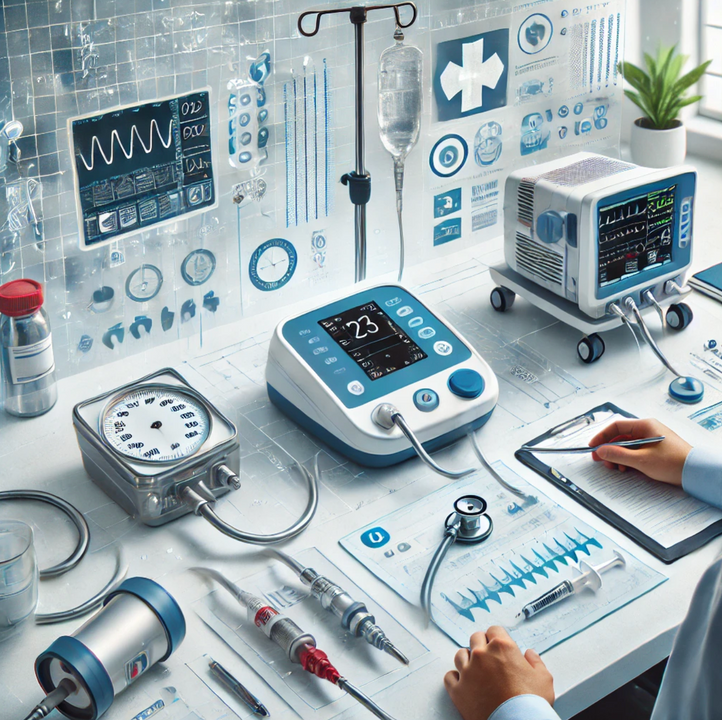The Importance of Regular Calibration for Medical Equipment
In healthcare, precision and accuracy are not just desired—they are critical. Whether it's diagnosing an illness, monitoring a patient’s condition, or performing a surgical procedure, healthcare professionals rely heavily on the performance of medical equipment. To ensure that this equipment functions at its best, regular calibration is essential. In this blog post, we will explore why calibration is vital for medical equipment, the risks of neglecting it, and how Truway Health can support healthcare facilities in maintaining their devices.
1. Ensuring Patient Safety
At the core of healthcare is the safety and well-being of patients. Inaccurate readings from medical devices can lead to misdiagnoses, incorrect treatments, or unnecessary procedures. For example, a blood pressure monitor that hasn’t been calibrated recently might show incorrect readings, which could result in the wrong dosage of medication being prescribed. This can have serious implications for patient health and safety.
Regular calibration ensures that medical equipment performs precisely and accurately, providing healthcare professionals with the reliable data they need to make informed decisions.
2. Compliance with Regulatory Standards
Healthcare providers must comply with stringent regulatory standards that govern the use and maintenance of medical equipment. Calibration is often a legal requirement, especially for devices used in patient diagnostics and treatment. Regulatory bodies like the FDA and ISO set specific guidelines on how frequently certain types of equipment should be calibrated to ensure their reliability.
Failing to regularly calibrate equipment not only puts patient care at risk but can also lead to legal issues, including fines and penalties for non-compliance. Keeping up with calibration schedules helps healthcare facilities avoid these risks and ensures that they meet all required standards.
3. Prolonging Equipment Lifespan
Medical equipment is a significant investment for healthcare facilities. Whether it's a vital signs monitor or an imaging machine, these devices require regular maintenance to function at their best over time. Regular calibration not only ensures that equipment delivers accurate results but also helps in identifying any potential issues before they become major problems.
Through routine calibration, minor deviations in performance can be detected and corrected, preventing wear and tear that could lead to costly repairs or even the need for replacement. In this way, calibration helps healthcare providers get the most value out of their equipment investments.
4. Maintaining Accuracy in Critical Applications
Certain medical devices are used in life-critical applications, such as ventilators, anesthesia machines, and defibrillators. In such situations, even the smallest error in equipment readings can have serious, potentially life-threatening consequences. Regular calibration is especially important for these devices to maintain their accuracy and reliability.
For example, a ventilator that provides inaccurate oxygen flow measurements could lead to inadequate patient support, while an uncalibrated defibrillator might not deliver the correct amount of energy during a cardiac arrest, reducing its effectiveness.
5. Improving Workflow and Efficiency
When medical equipment is not functioning properly, it can disrupt the entire workflow of a healthcare facility. Inaccurate or malfunctioning devices often require retesting, troubleshooting, or replacing, which can lead to delays in treatment, increased administrative work, and frustrated staff. All of these inefficiencies ultimately affect patient care.
By regularly calibrating equipment, healthcare providers can minimize downtime and ensure that devices are always ready for use. This improves the overall efficiency of the facility, allowing healthcare professionals to focus more on delivering quality care rather than dealing with equipment-related issues.
6. Reducing Liability and Risk
Healthcare providers are always exposed to the risk of medical malpractice claims, particularly if a patient suffers harm due to an incorrect diagnosis or improper treatment. In many cases, faulty or poorly calibrated equipment plays a role in these situations. Ensuring regular calibration can help reduce liability by ensuring that equipment consistently delivers accurate and reliable results.
Documenting each calibration event also provides a record of compliance, demonstrating that the healthcare facility takes all necessary precautions to maintain its equipment, which can serve as an additional layer of protection in the event of any legal challenges.
7. Supporting Technological Advancements
As medical technology continues to advance, devices are becoming more complex and capable of delivering highly detailed data. However, these advancements also increase the potential for accuracy drift in measurements. Regular calibration ensures that even the most sophisticated devices continue to perform according to manufacturer specifications.
For cutting-edge devices like CT scanners, MRI machines, and laboratory diagnostic tools, precision is key to their effectiveness. Regular calibration ensures that these advanced technologies continue to provide the accurate results necessary for modern medical treatments.
How Truway Health Can Help
At Truway Health, we understand the critical importance of regular calibration for medical equipment. That’s why we offer a range of services to help healthcare providers maintain their devices in peak condition, including:
- Scheduled Calibration Services: We provide scheduled calibration to ensure your equipment stays accurate and compliant with regulatory standards.
- Certified Technicians: Our technicians are certified and experienced in calibrating a wide range of medical equipment, ensuring the highest level of precision.
- Comprehensive Reports: After each calibration, we provide detailed reports documenting the performance of your equipment and any adjustments made, helping you stay compliant and informed.
- Tailored Solutions: We offer calibration plans tailored to your facility’s specific needs, whether you’re a small clinic or a large hospital.
By partnering with Truway Health, you can be confident that your medical equipment is always delivering accurate, reliable results—helping you provide the best care to your patients while staying compliant and efficient.
Conclusion
In the healthcare industry, regular calibration of medical equipment is not an option—it’s a necessity. From ensuring patient safety and regulatory compliance to improving workflow efficiency and reducing liability, calibration plays a vital role in the smooth operation of any healthcare facility. By prioritizing calibration and partnering with trusted providers like Truway Health, healthcare professionals can ensure their equipment performs optimally and delivers accurate results every time.
Truway Health News & Insights
Consistency Over Intensity: How to Make Wellness Stick
Consistency Over Intensity: How to Make Wellness Stick Wellness and self-care goals often start with...
Mobile‑Integrated Behavioral Activation With Wearable Sensor Support and Decentralized Verification: Protocol for a Randomized Behavioral Trial
Abstract Background: Behavioral activation delivered through mobile platforms has shown promise for...
When Your Body Won’t Settle Down Everyday Habits That Calm Inflammation
When Your Body Won’t Settle Down: Everyday Habits That Calm Inflammation Inflammation is a normal bi...
Truway Health Launches Innovative In-Vitro Cryo-Therapeutic Clinical Study
Advancing Cellular Preservation, Precision Therapy, and Translational Science Truway Health, Inc. is...
Everyday Stress, Handled: Practical Ways to Feel More Steady Day to Day
Everyday Stress, Handled: Practical Ways to Feel More Steady Day to Day Everyday stress is the mind-...
Creating Your Personalized Health Roadmap: Break Bad Habits and Build Long-Term Well-Being
Creating Your Personalized Health Roadmap: Break Bad Habits and Build Long-Term Well-Being Improving...







